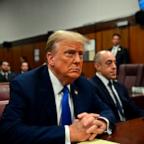Global trade talks fall apart
— -- Almost seven years of negotiations over a new global trade deal collapsed Tuesday amid predictions that it could be years before they are revived.
Trade ministers meeting in Geneva said they were unable to bridge the gap between the United States and other advanced nations on one side and developing countries such as India and China on the other.
Adjournment of what had been billed as a final attempt to agree on the central features of a new trade accord sparked immediate finger-pointing. U.S. business groups blamed India and China for insisting on special protections for their farmers. Others said advanced nations, including the U.S., shared responsibility.
"Who killed the Doha Round? They all did," said trade specialist Joe Guinan of the German Marshall fund in Brussels.
The talks' failure may mark a watershed after two decades of increasing globalization. The collapse comes against the backdrop of a weakening global economy and growing opposition to foreign trade and the associated high-profile job losses in the U.S. The Doha Round, named for the Qatari capital where the talks began in November 2001, was designed to benefit poorer nations by reducing trade-distorting farm subsidies. The U.S. and Europe would reduce their generous payments to farmers, it was hoped, in return for broader access to developing countries' markets for industrial goods.
But political problems emerged on both sides of that equation. The issue that scuttled the talks involved a demand by India and China for the right to increase tariffs if food imports surged. Both countries have several hundred million small-scale farmers whose livelihoods would be threatened by larger, more efficient U.S. and European producers.
Critics of the Doha process, saying rich countries were pushing a deal that would hurt food consumers everywhere, welcomed the talks' end. "Thank God no deal was reached," said Public Citizen's Lori Wallach.
But those who'd spent years in fruitless bargaining were dismayed. Pascal Lamy, director general of the World Trade Organization, said he would not "throw in the towel." Susan Schwab, the chief U.S. trade negotiator, vowed that the final U.S. offer would remain on the table. But others said there is no chance of a deal being reached this year.




